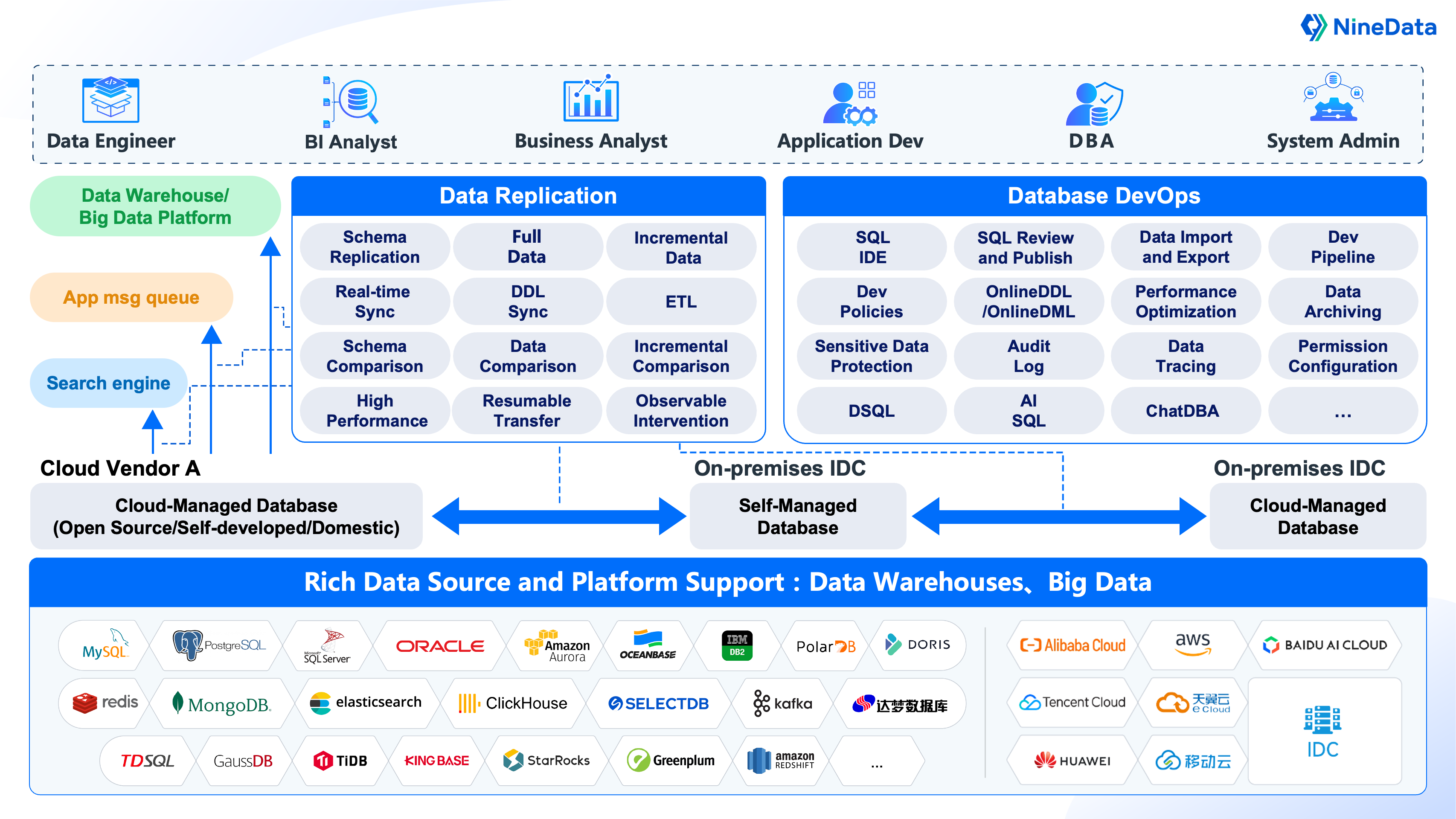What is NineData?
NineData is a cloud SaaS that integrates multiple modules of Database DevOps, data replication, data backup, and data comparison. It supports enterprise data management of database systems in hybrid cloud and/or multi-cloud environment, adddress the complexity and reduce the cost of data operation and maintenance for enterprise workloads.
Background
With the mature of cloud computing, hybrid cloud and multi-cloud architecture have become the mainstream IT architecture of many enterprises. Under this IT architecture, the unification and standardization of the management pane for multiple data sources in the hybrid cloud and multi-cloud environment pose new challenges for small and large companyes alike.
NineData redefines the concept of DMaaS(Data Management as a Service), providing fully-managed data management services for databases on hybrid-cloud and multi-cloud. The intergrated DMaaS includes Database DevOps, data replication, data backup/recovery and data comparison. These services simplify core application scenarios such as daily database development, data security access, production database change and release, database backup and recovery, data migration, disaster recovery and multi-activity, data warehouse and data lake construction with cloud native automation of CI/CO.
Function Description

| Function | Introduce |
|---|---|
| Database DevOps | A cloud-native database DevOps tool for online data querying and management, supporting multiple database types. It provides capabilities such as data querying, database DevOps, scheduled SQL tasks, data tracking and rollback, data archiving and cleaning, SQL code review, slow query analysis, bulk database changes, grouped queries and changes for databases and tables, test data generation, data import/export, and more. With real-time team collaboration mechanisms and customizable SQL development standards, it enables efficient and secure SQL development. |
| Backup and restore | A backup and recovery service for multiple databases in native multi-cloud environment, with the capabilities of second-level RPO, fine-grained data recovery, and online query of backup data. |
| Data replication | A real-time replication service between homogeneous and heterogeneous data sources, optimized for critical business scenarios such as data migration, disaster recovery, fault tolerance, data warehouse and data lake data integration. |
| Data comparison | A comparison service of both metadata and user data to ensure consistency between data sources. Data change SQL statements can be generated and applied to address any inconsistency. Database objects supported by data comparison include tables, stored procedures, functions, triggers, and views. |
Advantages
- Multi-environment and multi-cloud seamless connections : support seamless data flow and management between multiple cloud vendors and self-managed databases. Cloud platforms, such as AWS, Alibaba Cloud, Huawei Cloud and Tencent Cloud, are supported. Based on the proprietary network technology, users' data sources in the VPC network can be securely accessed through the private network. NineData's exclusive cluster and data gateway securily manage mission-critical data for customers.
- Rich data sources : Support unified management of homogeneous and heterogeneous data sources. With the business growth of an enterprise, it is difficult to use one kind of database to meet various business needs, and data management methods that combine multiple types of databases usually require the use of many different tools, which substantially complicate teh system and increase the cost of operation and maintenance. With the NineData platform, one can easily manage different database types with automation and discipline, signifcant reduce the total cost of data management.
- Full-link data security : Data is the core value of an enterprise, and data security leads the lifeblood of an enterprise. Around the entire life cycle of data, NineData provides end-to-end data encryption, effectively prevents unauthorized data operations, and guard against data leakage.
- SaaS : Cloud natively, out-of-the-box, turn on enterprise-level data management without pre-planning servers and pre-installing software. At the same time, NineData also provides complete task management services, including monitoring, alarm, anomaly detection and self-repair capabilities, which can greatly reduce operation case of the operation and maintenance for enterprises.
- High availability : All services are deployted on a high-availability architecture with built-in fault tolerance, which can automately switch workloads to available resource in the event of a failure. For long-running tasks such as replication, backup, and comparison, breakpoints are save. Once system back online, the tasks will resume with minimal manual actions for optimized recovery strategy.